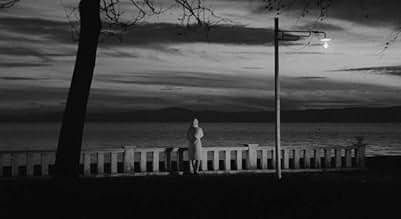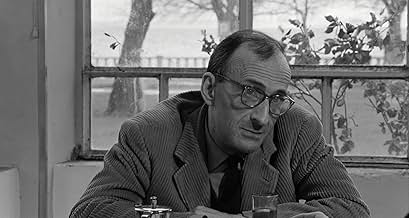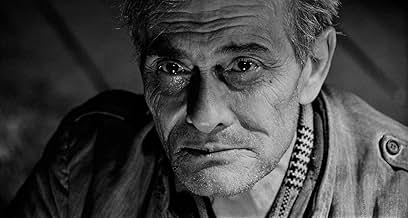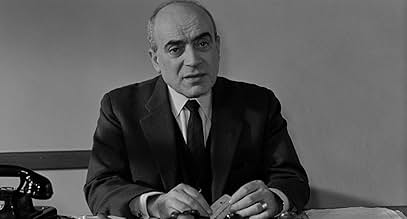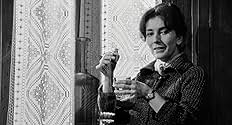IMDb RATING
7.0/10
1.7K
YOUR RATING
While visiting his favorite resort town during the off-season, a novelist investigates the apparent suicide of a woman he was infatuated with.While visiting his favorite resort town during the off-season, a novelist investigates the apparent suicide of a woman he was infatuated with.While visiting his favorite resort town during the off-season, a novelist investigates the apparent suicide of a woman he was infatuated with.
Pia Lindström
- Adriana
- (as Pia Lindstrom)
Pier Giovanni Anchisi
- Francesco - Photographer
- (as Piero Anchisi)
Anna Maria Gherardi
- Servant Girl
- (as Anna Gherardi)
Jean Rougeul
- The Journalist
- (uncredited)
Featured reviews
A young writer Bernardo (Peter Baldwin) decides to come back to a small town, set nearby a lake, where he had previously stayed and met a attractive maid and waitress – Tilde (Virna Lisi). The place is desolate then, as the action takes place in winter and the tourist are not particularly interested in this place at this part of the year. Bernardo is in search for peace and quiet and this is why he has an intention of having a rest there and working on his new book. However, after some time it dawns on him that, actually subconsciously, he wants to meet the beautiful waitress. He plans to rediscover her and starts searching, after which he is informed by the owner of the hotel about her mysterious death
This is often considered to be one of the earliest examples of giallo genre, along with Blood And Black Lace (1964). In spite of this fact, this cannot be considered, just like later effort by Bazzoni, masterful Footprints On The Moon (1975), to be a typical mystery that made a pattern for all films of this genre, as it differs drastically. In addition to this, the flick is more likely to remind Blow Up (1966) by Antonioni than The Bird With Cristal Plumage (1969) or Deep Red (1975) by Argento. The main character appears to be lost in the world of his own illusions and enquires himself what is real and what is just his imagination, just like David Hemmings in Antonioni's masterpiece. While Michelangelo Antonioni is more interested in general subject of perception and human identity in the world, in which being a witness is a very relative phenomenon, Bazzoni avoids such topics and focuses on delving into Bernardo's mind. Our protagonist himself is not a witness, he's just implicated in a twisted affair surrounding this town. To render psychological aspect even more visible and more articulate, the director utilizes a very slow pace and we can hear our character's thoughts. Owing to this, the viewer is able to follow all the vacillations of the main character and follow all possible ways of Tinde's demise accompanying this mystery envisioned by Bernardo. What is more, Bazzoni exploits black-and-white cinematography which makes things even more fascinating. To sum up, all these elements give it a very distinctive look and it is far from a simplistic murder mystery and the film becomes a sort of a psychological drama. At the end, nothing seems to be concluded and unraveled in detail. In spite of the fact that Bernardo's explanation is the most probable, there are plenty of additional subplots which suggest that many things remain obscure and inexplicable. Thanks to an exceptional editing, chilling sequences of dreams and flashbacks merged together, the ensemble looks terrific.
Therefore, nothing is certain in this flick. The whole plot is shown from the Bernardo's point of view, along with his visions and dreams. This render everything not only a murder mystery, but also a great psychoanalysis of the Bernardo's mentality, exposing all his fears, desires and his vague relationship with Tilde whose personality we get to know through his memory. Thus, this subjective nature and unusual perspective make it so extraordinary and riveting. The script itself isn't the biggest advantage of this picture. If it was made by somebody else, it would possibly be a flop. Fortunately, on account of tremendous direction by Bazzoni, his visual style, exquisite taste for creating adequate atmosphere of anticipation and ambiguity, The Possessed (1965) (La donna del lago) is a true gem.
The cast is nothing special, but all of the actors manage to achieve a satisfying level of acting artistry. Peter Baldwin, a little known television actor, gives a quite decent performance. There are a couple of familiar faces: such as Phillipe Leroy, known for his roles in Yankee (1966) by Tinto Brass, and Salvo Randone from Investigation of a Citizen Above Suspicion (1970) by Elio Petri. Their roles are rather a minor ones, as Peter Baldwin is the most important character and the action revolves around him.
Overall, La donna del lago (1965) might not be as visually striking as gorgeous Footprints On The Moon (1975), nonetheless it's a very impressive little movie that should be more known than actually it is. The story itself is nothing really new, but the way it is executed makes this one refreshing and worth a look. Luigi Bazzoni attaches a great importance to a psychological aspect of characters in the film and owing to this outshines many other flicks in its genre. Now, it remains only a hidden gem and sadly it seems there is no possibility to popularize it in the nearest future. Pity. This deserves to be more prevalent.
Therefore, nothing is certain in this flick. The whole plot is shown from the Bernardo's point of view, along with his visions and dreams. This render everything not only a murder mystery, but also a great psychoanalysis of the Bernardo's mentality, exposing all his fears, desires and his vague relationship with Tilde whose personality we get to know through his memory. Thus, this subjective nature and unusual perspective make it so extraordinary and riveting. The script itself isn't the biggest advantage of this picture. If it was made by somebody else, it would possibly be a flop. Fortunately, on account of tremendous direction by Bazzoni, his visual style, exquisite taste for creating adequate atmosphere of anticipation and ambiguity, The Possessed (1965) (La donna del lago) is a true gem.
The cast is nothing special, but all of the actors manage to achieve a satisfying level of acting artistry. Peter Baldwin, a little known television actor, gives a quite decent performance. There are a couple of familiar faces: such as Phillipe Leroy, known for his roles in Yankee (1966) by Tinto Brass, and Salvo Randone from Investigation of a Citizen Above Suspicion (1970) by Elio Petri. Their roles are rather a minor ones, as Peter Baldwin is the most important character and the action revolves around him.
Overall, La donna del lago (1965) might not be as visually striking as gorgeous Footprints On The Moon (1975), nonetheless it's a very impressive little movie that should be more known than actually it is. The story itself is nothing really new, but the way it is executed makes this one refreshing and worth a look. Luigi Bazzoni attaches a great importance to a psychological aspect of characters in the film and owing to this outshines many other flicks in its genre. Now, it remains only a hidden gem and sadly it seems there is no possibility to popularize it in the nearest future. Pity. This deserves to be more prevalent.
Glorious first film from Luigi Bazzoni, who would go on to make, The Fifth Cord and Footprints. Here with wonderful b/w cinematography from Barboni we have a straightforward enough, if noirish, beginning, gradually deepening into something resembling a gothic horror before developing before our very eyes into something more resembling a giallo. Always good to look at and with persuasive and involving dialogue, this engages from the start and although the tale is leisurely told, occasionally resembling Last Year At Marienbad, we never loose interest. Yet another near lost gem wonderfully restored thanks to Arrow. Oh and I almost forgot, we get a dreamy substantial cameo from the lovely Virna Lisi.
Fascinatingly dark and elusive, 'La Donna Del Lago' (aka) 'The Possessed' (1965) ominously remains a thrillingly enigmatic, majestically mysterious, almost impenetrable crypto-Giallo by the consistently excellent film stylist, Luigi Bazzoni, the prodigiously talented, intellectual auteur behind equally idiosyncratic, doom-laden, darkly dreamt anti-Gialli masterpiece, 'Footsteps on the Moon'(1975). Since 'La Donna Del Lago' was also written by fellow dramatic iconoclast, Gulio 'Death Laid an Egg' Questi, one might certainly expect to experience a similarly oblique tone, and in terms of starkly confounding genre conventions, skewed scrivener, Questi most certainly doesn't disappoint! While some might consider 'Lady of The Lake' to be just another indulgent example of overwrought nouvelle vague-esque cinematic doodling; but to blithely dismiss this eerily elegiac work as mere self-indulgence is, perhaps, to miss out of one of Italian genre cinema's most glacial,immaculately shot, singularly strange, wickedly off-key, noggin-scratchingly unique thrillers!
This early giallo has the look of Bazzoni's later The Fifth Cord and the mood of his last film Footprints On the Moon, and once again the director impresses with a mix of noir-ish visuals and people thinking a lot.
Bernardo is a burned out writer who, following a failed relationship, heads to a hotel on the edge of a lake where he was once infatuated with a maid named Tilde. He plans to take their relationship further, but only if he can find her. He should have probably asked where she was while he was on the phone booking a room because it turns out that Tilde committed suicide the previous winter. Maybe he booked through Trivago or something and didn't get the chance to speak to a real person.
Someone in town confides in Bernardo that there's a rumour going around town that as well as ingesting poison Tilde must also have accidentally slashed her own neck with a knife too, which sets off Bernardo on a quest to find out what really happened to this woman he was technically stalking. Seriously - at one point we get a flashback to Bernardo spying on Tilde getting some from a mysterious horny stranger.
The mystery deepens as certain characters in the hotel start behaving strangely. First off there's the owner's daughter Irma, who is upset that the family's reputation is shattered, then there's her brother Mario and his weird wife who barely talks and walks around the lake at midnight, then there's the owner himself, whose happy, servile façade begins to slip as Bernardo goes snooping around the place.
Although there's not a lot of action in this one the general moodiness of the piece is cranked way up. Just like the brilliant Fifth Cord, Bazzoni uses light sources a lot here and often has his actors standing in front of harsh lighting, saving the weirdest light tricks for when Bernardo is either fantasising about the suspects motives or having one of many vivid dreams. There's quite a lot to compare to Footprints on the Moon as well, with one lonely character in a deserted holiday resort trying to figure some strange puzzle out.
For a really early giallo, and for Bazzoni's debut, this is a slick, well made film. It would be a good double-bill with Libido and The Third Eye (an early giallo with all the nastiness in place).
Bernardo is a burned out writer who, following a failed relationship, heads to a hotel on the edge of a lake where he was once infatuated with a maid named Tilde. He plans to take their relationship further, but only if he can find her. He should have probably asked where she was while he was on the phone booking a room because it turns out that Tilde committed suicide the previous winter. Maybe he booked through Trivago or something and didn't get the chance to speak to a real person.
Someone in town confides in Bernardo that there's a rumour going around town that as well as ingesting poison Tilde must also have accidentally slashed her own neck with a knife too, which sets off Bernardo on a quest to find out what really happened to this woman he was technically stalking. Seriously - at one point we get a flashback to Bernardo spying on Tilde getting some from a mysterious horny stranger.
The mystery deepens as certain characters in the hotel start behaving strangely. First off there's the owner's daughter Irma, who is upset that the family's reputation is shattered, then there's her brother Mario and his weird wife who barely talks and walks around the lake at midnight, then there's the owner himself, whose happy, servile façade begins to slip as Bernardo goes snooping around the place.
Although there's not a lot of action in this one the general moodiness of the piece is cranked way up. Just like the brilliant Fifth Cord, Bazzoni uses light sources a lot here and often has his actors standing in front of harsh lighting, saving the weirdest light tricks for when Bernardo is either fantasising about the suspects motives or having one of many vivid dreams. There's quite a lot to compare to Footprints on the Moon as well, with one lonely character in a deserted holiday resort trying to figure some strange puzzle out.
For a really early giallo, and for Bazzoni's debut, this is a slick, well made film. It would be a good double-bill with Libido and The Third Eye (an early giallo with all the nastiness in place).
Recently, I had been impressed with Bazzoni's weird offering FOOTPRINTS (1975); so, when I happened upon this even more obscure (and, by all accounts, rarer) earlier title from him, I decided to check it out and, boy, is it a find for Euro-Cult/Art-house buffs! The film, in fact, can perhaps best be described as an arty semi-giallo; interestingly, it contains several echoes to Bazzoni's later effort: the resort town, the central hotel setting, the strange characters encountered by the hero (in FOOTPRINTS, the bewildered protagonist was a woman), the mystery revolving around a missing person not to mention the deliberate (and deliberately-paced) oblique narrative.
What is immediately arresting here (in spite of the somewhat fuzzy quality of the print on display) is the supreme style allotted to the film's look which is wintry, bleak and forbidding by its two directors (incidentally, this was Rossellini's only stint in such capacity!); to this end, they wisely recruited veterans such as cinematographer Leonida Barboni (but who also adopts peculiar framing throughout, none more so that the pan in extreme close-up of a character's face with the gleaming lake for backdrop!) and production designer Luigi Scaccianoce. However, equally important to the fabric of the piece are the contributions of Renzo Rossellini (supplying an appropriately moody score) and editor Nino Baragli (whose frequent jump-cuts and seamless juxtaposition between reality, recollection and outright fantasy create a genuine and admirably disorientating effect on the viewer). Incidentally, THE POSSESSED a misleading English title but a literal translation of the original, THE LADY OF THE LAKE, would be no less ambiguous! was co-written (with Bazzoni and Franco Rossellini) by Giulio Questi; for the record, as a director in his own right, the latter went on to make such idiosyncratic yet haunting revisions of genre convention as the Spaghetti Western DJANGO, KILL IF YOU LIVE, SHOOT! (1967) and the giallo DEATH LAID AN EGG (1968).
The cast is compact but exceptionally noteworthy: Peter Baldwin (very good in Dino Risi's LOVE IN ROME [1960] here, in what I assume to be his most significant role, he's downright excellent!), Salvo Randone (as the owner of the hotel whom the hero suspects of both lechery and murder, he manages to alternate between a genial and sinister countenance throughout), Valentina Cortese (a typically fine performance, though her weather-beaten looks make it hard to convince us she's Randone's daughter even if a reasonable age gap separates the two actors!), Philippe Leroy (having appeared in so many films from the 1960s and 1970s that I've watched in recent years and, thanks also to his remarkable versatility, the French actor has become a firm favorite of mine!), Virna Lisi (while undeniably sensual, her contribution basically amounts to an extended cameo since her character, who seems to have turned the heads of virtually the entire male cast at some point, is already dead when the film opens and we only see the girl in flashback/fantasy sequences!) and Pia Lindstrom (a rare cinematic appearance by Ingrid Bergman's elder daughter being similarly steeped in mystery, alas, she too is barely given time to create a flesh-and-blood character but, then, her resultant fragile performance emerges to be all the more moving for it!).
The plot concerns an author (Baldwin) arriving off-season at a resort town he habitually retired to in order to work, hoping to meet again a servant-girl (Lisi) he's enamored of employed at the hotel run by Randone; however, he's told she's no longer there but notices that her cloak is still hanging in the closet, follows a woman in the streets he sees wearing it (and is eventually disappointed to learn the outfit now belongs to Lisi's replacement). Typically, he decides to delve deeper into the mysterious circumstances surrounding the former maid's demise still, Randone and his family (Cortese assists in the managing of the establishment while brother Leroy owns a butcher shop situated in the courtyard of the hotel itself and, coincidentally, has just returned from his honeymoon with wealthy but naïve and sickly bride Lindstrom) generally evade his probing. Even the only man who's willing to help at first a hunchbacked local photographer (I'm not sure about the actor's name but his face is awfully familiar!), who presents Baldwin with a photo in which Lisi is visibly pregnant suddenly opts out and leaves town in a hurry!; then, there's Lisi's alcoholic bum of a father who seems to have nothing of value for the hero to work on venting the anger and frustration over his daughter's loss by bursting into vitriolic (but ineffectual) nightly rants outside the hotel windows! At one point, Lindstrom makes a weak attempt to communicate with Baldwin but, before they can meet (he had previously noticed the girl walking aimlessly by the lake at night a number of times, but never quite mustered the nerve to confront her), she too is found dead! Eventually, the hero starts to think he may have gotten it all wrong: perhaps Lisi wasn't so much a victim of circumstance (periodically abused by both father and son!) as a femme fatale who got killed simply because she was too greedy.
The final revelation then, takes things in another direction altogether; while certainly effectively handled, the scene does perhaps constitute a slight let-down as it won't surprise anyone familiar with Mario Bava's THE GIRL WHO KNEW TOO MUCH (1963), actually the film credited with originating the giallo tradition, in which Cortese also features
What is immediately arresting here (in spite of the somewhat fuzzy quality of the print on display) is the supreme style allotted to the film's look which is wintry, bleak and forbidding by its two directors (incidentally, this was Rossellini's only stint in such capacity!); to this end, they wisely recruited veterans such as cinematographer Leonida Barboni (but who also adopts peculiar framing throughout, none more so that the pan in extreme close-up of a character's face with the gleaming lake for backdrop!) and production designer Luigi Scaccianoce. However, equally important to the fabric of the piece are the contributions of Renzo Rossellini (supplying an appropriately moody score) and editor Nino Baragli (whose frequent jump-cuts and seamless juxtaposition between reality, recollection and outright fantasy create a genuine and admirably disorientating effect on the viewer). Incidentally, THE POSSESSED a misleading English title but a literal translation of the original, THE LADY OF THE LAKE, would be no less ambiguous! was co-written (with Bazzoni and Franco Rossellini) by Giulio Questi; for the record, as a director in his own right, the latter went on to make such idiosyncratic yet haunting revisions of genre convention as the Spaghetti Western DJANGO, KILL IF YOU LIVE, SHOOT! (1967) and the giallo DEATH LAID AN EGG (1968).
The cast is compact but exceptionally noteworthy: Peter Baldwin (very good in Dino Risi's LOVE IN ROME [1960] here, in what I assume to be his most significant role, he's downright excellent!), Salvo Randone (as the owner of the hotel whom the hero suspects of both lechery and murder, he manages to alternate between a genial and sinister countenance throughout), Valentina Cortese (a typically fine performance, though her weather-beaten looks make it hard to convince us she's Randone's daughter even if a reasonable age gap separates the two actors!), Philippe Leroy (having appeared in so many films from the 1960s and 1970s that I've watched in recent years and, thanks also to his remarkable versatility, the French actor has become a firm favorite of mine!), Virna Lisi (while undeniably sensual, her contribution basically amounts to an extended cameo since her character, who seems to have turned the heads of virtually the entire male cast at some point, is already dead when the film opens and we only see the girl in flashback/fantasy sequences!) and Pia Lindstrom (a rare cinematic appearance by Ingrid Bergman's elder daughter being similarly steeped in mystery, alas, she too is barely given time to create a flesh-and-blood character but, then, her resultant fragile performance emerges to be all the more moving for it!).
The plot concerns an author (Baldwin) arriving off-season at a resort town he habitually retired to in order to work, hoping to meet again a servant-girl (Lisi) he's enamored of employed at the hotel run by Randone; however, he's told she's no longer there but notices that her cloak is still hanging in the closet, follows a woman in the streets he sees wearing it (and is eventually disappointed to learn the outfit now belongs to Lisi's replacement). Typically, he decides to delve deeper into the mysterious circumstances surrounding the former maid's demise still, Randone and his family (Cortese assists in the managing of the establishment while brother Leroy owns a butcher shop situated in the courtyard of the hotel itself and, coincidentally, has just returned from his honeymoon with wealthy but naïve and sickly bride Lindstrom) generally evade his probing. Even the only man who's willing to help at first a hunchbacked local photographer (I'm not sure about the actor's name but his face is awfully familiar!), who presents Baldwin with a photo in which Lisi is visibly pregnant suddenly opts out and leaves town in a hurry!; then, there's Lisi's alcoholic bum of a father who seems to have nothing of value for the hero to work on venting the anger and frustration over his daughter's loss by bursting into vitriolic (but ineffectual) nightly rants outside the hotel windows! At one point, Lindstrom makes a weak attempt to communicate with Baldwin but, before they can meet (he had previously noticed the girl walking aimlessly by the lake at night a number of times, but never quite mustered the nerve to confront her), she too is found dead! Eventually, the hero starts to think he may have gotten it all wrong: perhaps Lisi wasn't so much a victim of circumstance (periodically abused by both father and son!) as a femme fatale who got killed simply because she was too greedy.
The final revelation then, takes things in another direction altogether; while certainly effectively handled, the scene does perhaps constitute a slight let-down as it won't surprise anyone familiar with Mario Bava's THE GIRL WHO KNEW TOO MUCH (1963), actually the film credited with originating the giallo tradition, in which Cortese also features
Did you know
- ConnectionsReferenced in Once Upon a Time... in Hollywood (2019)
- How long is The Possessed?Powered by Alexa
Details
- Release date
- Country of origin
- Language
- Also known as
- Love, Hate and Dishonor
- Filming locations
- Brunico, Bolzano, Trentino - Alto Adige, Italy(lakeside town: street views, shops, train station)
- Production companies
- See more company credits at IMDbPro
- Runtime
- 1h 35m(95 min)
- Color
- Sound mix
- Aspect ratio
- 1.85 : 1
Contribute to this page
Suggest an edit or add missing content

